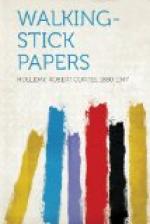A quaint little duodecimo is the “Jaarbockie voor de Stad Delft,” with little headpieces pictorially representing the seasons and a curiously wood-cut astrologer introducing “den Almanak.” A rather square-toed kind of a little volume, neatly bound in grey boards, and very nicely printed, having altogether an effect of housewifely cleanliness, is the “Verslag van den Toestand der Gemeente Haarlem over het jaar 1894. Door Burgemeester en Wethouders Uitgebracht aan den Gemeenteraad; imprint Gedrukt bij Gebr Nobels, te Haarlem.”
The language of Great Britain’s municipal documents is lofty: “The Royal Burrough of Kensington, Minute of His Worship the Mayor (Sir H. Seymour King, K.C.I.E., M.P.) for the year ending November, 1901.” (Here is imprinted the design of a quartered shield containing a crown, a Papal hat, and two crosses, and, beneath, the motto: “Quid Nobis Ardui.”) “Printed” (continues the reading) “by order of the Council, 30th, October, 1901. Jas. Truscott and Son, Printer, Suffolk Lane, E.C.” And in the following there is something of the rumble of the history of England:
“Addresses Presented from the Court of Common Council to the King.
On his Majesty’s Accession to the Throne, And on various other Occasions, and his Answers, Resolutions of the Court, Granting the Freedom of the City to several Noble Personages; with their Answers, Instructions at different Times to the Representatives of the City in Parliament. Petitions to Parliament for different Purposes, Resolutions of the Court, On the Memorial of the Livery, to request the Lord Mayor to call a Common Hall; For returning Thanks to Lord Chatham, And his Answer; For erecting a Statue in Guildhall, to William Beckford, Esq.; late Lord Mayor, Agreed to between the 23d October, 1760, and the 13th. October, 1770 Printed by Henry Fenwick, Printer to the Honorable City of London.”
Henry Fenwick, Esq., takes himself with dignity.
But to turn from the pomp of state, to peep for a moment at the intimate life of the people of England a couple of centuries ago, few things could be better than “The Constable’s Accounts of the Manor of Manchester,” from which a few items of “Disbursements” are cited;




